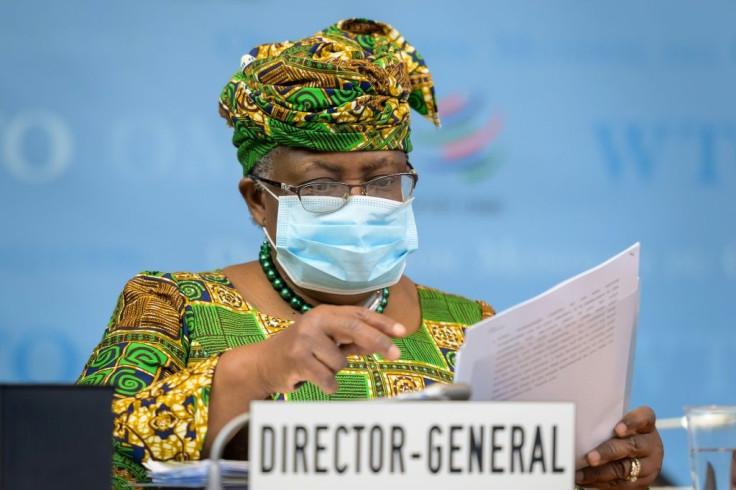WTO Says 2021 Global Trade Recovery Rests On Vaccines
Global trade is set to grow by eight percent in 2021, the World Trade Organization said Wednesday, stressing that the route out of the Covid-19 crisis rested on the rapid rollout of vaccines.
The predicted bounce-back in global merchandise trade by volume is slightly stronger than the WTO's previous 7.2 percent forecast issued in October.
The organisation said global trade shrank by 5.3 percent in 2020 as the coronavirus pandemic shocked the world economy.
"The strong rebound in global trade since the middle of last year has helped soften the blow of the pandemic for people, businesses, and economies," said the WTO's new boss Ngozi Okonjo-Iweala.
The global trade body's assessment of the Covid-19's impact on 2020 trade is nowhere near as bad as had been first predicted when the pandemic broke out.
A year ago, the WTO had cautioned that global trade could plummet by a third in 2020 but gradually revised that estimate to an expected 9.2-percent drop.
It said strong monetary and fiscal policies were the main drivers behind the smaller-than-expected contractions in growth and trade.
"Prospects for a quick recovery in world trade have improved as merchandise trade expanded more rapidly than expected in the second half of last year," the Geneva-based organisation said.
While the rebound this year will be stronger than expected, growth is forecast to slow to 4.0 percent in 2022, the WTO said.
It warned that the effects of the Covid-19 crisis "will continue to be felt as this pace of expansion would still leave trade below its pre-pandemic trend".
Okonjo-Iweala warned that any rebound in global trade remained vulnerable to the still-raging coronavirus pandemic.
"New waves of infection could easily undermine any hoped-for recovery," she told reporters.

The Nigerian former finance minister said the rapid development of effective vaccines had given the planet a realistic chance of quelling the pandemic and kick-starting the world economy again.
But the opportunity could yet be squandered if large parts of the world are shut out of access to vaccine doses.
"Rapid global and equitable vaccine rollout is the best stimulus plan we have for the strong and sustained economic recovery that we all need," Okonjo-Iweala said.
However, "as long as large numbers of people and countries are excluded from sufficient vaccine access, it will stifle growth, and risk reversing the health and economic recovery worldwide," warned the former World Bank development economist.
Some 52 percent of the Covid-19 vaccine doses administered so far have been in high-income countries accounting for 16 percent of the global population, according to an AFP count.
Just 0.1 percent have been administered in the 29 lowest-income countries, home to nine percent of the world's population.
The WTO is planning to host a meeting in April with vaccine manufacturers to see what it can do to help speed up development and smooth out the supply chain.
Okonjo-Iweala said one major Covid-19 vaccine-maker required 280 different components from 19 countries for its jabs, and any restrictions along the way were simply making it harder to ramp up production.
The Middle East was predicted to see the strongest export growth this year, with an anticipated 12.4-percent hike, while South America was expected to see the weakest growth at 3.2 percent.
As for imports, the strongest growth is forecast to be in North America at 11.4 percent, with the weakest in Africa at 5.5 percent.
Okonjo-Iweala reflected on the pricy chaos caused when giant container ship MV Ever Given got stuck for nearly a week in the Suez Canal.
"The fact that the Ever Given was able to cause so much disruption is a sign that global merchandise trade is relatively robust, and that global supply chains have held up through the pandemic," she said.





















